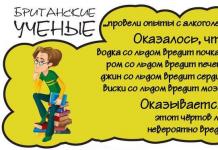- Tongue twister. Basic Concepts
— Recommended rules for practicing tongue twisters
— Tongue twisters starting with the letter R
— Tongue twisters starting with the letter Z
— Tongue twister starting with the letter H
— Tongue twister starting with the letter Sh
— Tongue twister starting with the letter Ш
- From complex tongue twisters
— About modern tongue twisters
A tongue twister is, as a rule, a short phrase or small text, which is a sentence or a set of sentences built according to the syntactic laws of a certain language, and which contains combinations of sounds that deliberately make it difficult to quickly pronounce words. The form of a tongue twister can be either rhymed (in verse) or non-rhymed.
Tongue twisters, also popularly called pure tongue twisters (sometimes even frequent tongue twisters) or tongue twisters, appeared in Rus' as a small folklore genre for children and adults. Since ancient times, “speaking quickly,” that is, quickly, clearly and correctly pronouncing the most complex combinations of sounds or long words, has been an exciting folk game in which the most skillful, dexterous and skillful speakers competed. Russian tongue twisters are complex; sometimes it is even difficult to simply pronounce some combinations, let alone pronounce a pure tongue twister at a fast pace, repeating it several times.
It is precisely these tongue twisters, which, when pronounced “you can break your tongue,” are an excellent exercise for developing diction and other vocal skills of oratory, which you can read about in the lesson on making a speech. And they are widely used not only by parents who want to improve their children’s diction and teach them to correctly pronounce the sounds of their native language, but also by professional actors, announcers, TV presenters, and politicians to develop speech pronunciation skills.
Tongue twisters are considered a very effective method of training the articulation of sounds, getting rid of tongue-tiedness, speech defects, and promoting the development of correct speech. You should train the pronunciation of tongue twisters in stages: to achieve the best effect, the tongue twister is first pronounced clearly and slowly, then gradually increasing the tempo and adjusting diction and articulation.
Quite tongue twisters are often classified according to different criteria; tongue twisters are usually distinguished as complex or difficult, long, special for diction, fast, folk, and so on.
The choice of tongue twisters for speech development depends on the individual and the phonetic features of his diction. Pay attention to exactly those sounds and combinations of sounds whose pronunciation causes you difficulty. You can choose tongue twisters designed to train the sounds you need.
1) At first, words must be pronounced slowly, syllable by syllable, pronouncing them clearly, following the rhythm of pronunciation, then, as you improve, speed up the pace.
2) Pay special attention to the sharp underlining of endings in words, this improves diction, but again you need to remember the rule: do not make the consonants heavier, but activate them.
3) Gradually try to pronounce tongue twisters in one breath.
4) You can say them in front of the mirror silently and then in a whisper, but the sounds must be clear and audible.
5) Try to pronounce a familiar text in different voices: children's, women's, men's, sing the words.
7) For your variety, you can add movement while pronouncing a tongue twister: squat, jump, box, dance, etc.
8) Alternatively, the words of a difficult-to-talker can be set to the music of some folk song, for example, “There was a birch tree in the field” and sung with pleasure.
So, the main rule of good pronunciation: to speak quickly, you need to learn to speak slowly.
— Tongue twisters starting with the letter R
* * *
Grass in the yard, firewood on the grass
Don't cut wood on the grass in your yard.
* * *
Karl stole corals from Clara,
Clara stole Karl's clarinet.
* * *
The crow missed the crow.
* * *
The ships tacked and tacked, but did not tack.
* * *
One, two, three, repeat:
The enemy is not a friend, the legs have no hands...
* * *
Three magpies chattered on the slide.
* * *
Brother tells sister for three days.
I'm having a holiday soon.
Third birthday.
Let's eat jam.
— Tongue twisters starting with the letter Z
* * *
Scared of the bear cub
Hedgehog with a hedgehog and with a hedgehog,
Swift with a swift and a haircut.
* * *
A beetle is buzzing over the honeysuckle.
The casing is heavy on the beetle.
* * *
I met a hedgehog in a thicket:
- How is the weather, hedgehog?
- Fresh!
And we went home, trembling,
Hunching, cowering, two hedgehogs.
* * *
The hedgehog has a hedgehog, the snake has a snake.
* * *
Once upon a time there was a beetle, there was a beetle.
* * *
A crane is not a suitor for a toad.
* * *
It's terrible for a beetle to live on a bitch.
— Tongue twister starting with the letter H
* * *
Four turtles have four baby turtles.
* * *
The student was learning his lessons, his cheeks were inky.
* * *
Tea saucers break easily.
* * *
The more often I clean, the cleaner the cup.
* * *
Four little devils
Four little black, grimy little devils
A drawing was drawn in black ink.
— Tongue twister starting with the letter Sh
* * *
Here's a huge one hissing:
-Very stuffy. I'd like to take a shower.
You need to take a shower
So that it wouldn't be so stuffy.
* * *
At the edge of a hut
Old chattering ladies live.
Every old lady has a basket,
There's a cat in every basket,
Cats in baskets sew boots for old women.
* * *
Egor walked through the yard
Carrying an ax to repair a fence
* * *
Sasha sewed a hat for Sasha,
Sashka hit a bump with his hat.
* * *
Sasha walked along the highway and sucked on a dryer.
* * *
Masha sewed for the monkey
A fur coat, a hat and pants.
* * *
When I'm in a hurry, I eat noodles.
I'll finish the noodles and hurry.
I'm in a hurry.
Noodle noodles.
Well, I'll make everyone laugh again.
— Tongue twister starting with the letter Ш
* * *
Two puppies, cheek to cheek,
They pinch the brush in the corner.
* * *
Mom, don't look for us,
We are looking for sorrel for cabbage soup.
* * *
The goldfinch was a goldfinch.
* * *
Tongs and pliers - these are our things.
* * *
The bristles of a pig, the scales of a pike.
Funny tongue twisters
The mouse crawled under the lid
To gnaw the crumbs under the lid,
The mouse is probably dead -
The mouse forgot about the cat!
* * *
Chickens, geese and turkeys pecked at the parsley,
We ate some quinoa and ran for water.
* * *
Skinny, weak Koschey
Carrying a box of vegetables.
* * *
Yasha and Pasha ate porridge,
Sasha and Masha make curdled milk
And Mishutka ate a herring under his fur coat.
* * *
It’s a hassle to catch a cunning magpie,
And forty forty is forty troubles.
* * *
Behind the village, near a country road, a quail sang in a field.
The quail has flown in, the quail has flown.
* * *
The parrot said to the parrot:
I'll scare you, parrot.
The parrot answers him:
Parrot, parrot, parrot!
* * *
The ship was carrying caramel,
The ship ran aground,
And the sailors for three weeks
We ate the caramel broke.
* * *
Once upon a time a crucian carp
Gave me a coloring book.
And Karas said:
“Color the fairy tale, Karasyonok!”
On the Karasenka coloring page -
Three funny little pigs:
The little crucian turned the piglets into crucian carp!
Beautiful, clear speech is not only comfortable communication, but also a kind of calling card of an educated person. It helps to create a good impression on the interlocutor, win him over and convey your thoughts to him. Unfortunately, the culture of speech and its general level today has noticeably decreased. It is increasingly rare to find an adult with perfect diction and well-developed speech skills. What can we say about children and adolescents, among whom the number of those who cannot pronounce the sounds “r”, “s”, “sh”, etc. has recently increased. Fortunately, speech therapy has long known methods for correcting burr, lisp and other speech problems. flaws. Among the most effective and accessible correctional activities are tongue twisters for the development of speech and diction. These are well-known short and long phrases/poems, the repetition of which helps correct speech defects. Ideally, to achieve a quick and lasting positive effect, tongue twisters should be combined with articulatory gymnastics and other speech therapy exercises. But these simple training texts themselves, with regular practice, can significantly improve speech skills. Next you will find a selection of the best tongue twisters for children 3-4, 5-6 and 10-12 years old who have problems with pronunciation. In addition, you will find more complex versions of tongue twisters for adults, including those undergoing rehabilitation after a stroke.
Tongue twisters for the development of speech and diction in children: exercise options for different ages

The positive impact of tongue twisters on the development of speech and diction is most easily observed in children of different ages (exercise options below). Moreover, we are talking not only about children with pronunciation problems, but also about children with normal speech development. The fact is that tongue twisters help not only automate certain sounds that are difficult for a child, but also train clear speech. That is why tongue twisters are often recommended to be used in working with children 3-4 years old who do not have any special speech problems. These simple exercises help children at this age get rid of the excessive softness of pronunciation characteristic of children. In addition, tongue twisters can correct errors in the already formed speech of older children. For example, with the help of such texts you can train breathing and tempo, which has a positive effect on all children’s speech
Tongue twisters for speech development in children 3 years old
Below are options for simple tongue twisters for speech development in 3-year-old children. By regularly repeating them with your child, you can significantly improve his pronunciation and expand your baby’s vocabulary.
Sounds K, G, X, Y
1. Ko-ko-ko- the cat loves milk.
2. Ga-ga-ga the goat has horns.
3. Ha-ha-ha - we can’t catch the rooster.
4. Oh-oh-oh-bunny is cold in winter.
5. Geese are cackling on the mountain.
6. A fly landed on the hamster’s ear.
Sounds F, V
1. Af-af-af- we will put a closet in the corner.
2. Woo-woo-woo - an owl was seen in the forest.
3. Fanya has a sweatshirt, and Fedya has shoes.
4. Our Filat is never to blame.
Sound S(s).
1. Sonya’s sleigh goes down the hill on its own.
2. Senya met a fox in the forest.
3. Our gas has gone out.
4. Su-su-su-su - quiet in the forest in autumn.
5. Senya carries hay to Senya, Senya will sleep on the hay.
1. We wash Zu-zu-zu-bunny in a basin.
2. Zina has a goat in her basket.
3. Lisa bought Zina a basket in the store.
4. Zoya and Zina are drinking juice at the store.
5. Zina’s bell rings loudly.
6. Little Zina’s bunny sleeps in a basket.
Options for tongue twisters for speech and diction development in children 5-6 years old
Children aged 5-6 years often experience irregular breathing and an erratic rate of pronunciation, especially when speaking in a hurry. Using the tongue twister options from the selection below to train speech skills and correct sound pronunciation in children of this age category.
Grass in the yard, firewood on the grass
Don't cut wood on the grass in your yard.
Karl stole corals from Clara,
Clara stole Karl's clarinet.
The ships tacked and tacked, but did not tack.
Greek rode across the river,
He sees a Greek - there is a cancer in the river.
The Greek put his hand in the river,
Cancer for the hand of the Greek - DAC!
Scared of the bear cub
Hedgehog with a hedgehog and with a hedgehog,
Swift with a swift and a haircut.
The best tongue twisters for developing speech and improving diction in children 10-12 years old
At the age of 10-12 years, speech is almost completely formed. Therefore, if there are any defects, good speech therapy work is required, including the use of tongue twisters. But even without any special defects, repetition of special texts has a positive effect on the automation of speech, its purity and correctness. Here are several options for tongue twisters that are relevant for children of this age group.
In the depths of the tundra
Otters in spats
Poking into buckets
Cedar kernels! Ripped off an otter
Gaiters in the tundra
The otter will wipe the kernels of the cedars
I'll wipe the otter's face with my leggings
Kernels in buckets
I'll take the otter to the tundra!
At the edge of a hut
Old chattering ladies live.
Every old lady has a basket,
There's a cat in every basket,
Cats in baskets sew boots for old women.
The mouse crawled under the lid
To gnaw the crumbs under the lid,
The mouse is probably dead -
The mouse forgot about the cat!
Once upon a time a crucian carp
Gave me a coloring book.
And Karas said:
“Color the fairy tale, Karasyonok!”
On the Karasenka coloring page -
Three funny little pigs:
The little crucian turned the piglets into crucian carp!
Long tongue twisters for the development of speech and diction in teenagers - ready-made exercises

If speech defects were not corrected in childhood, then you should not despair. Properly selected long tongue twisters for the development of speech and diction also work great for teenagers if used in speech therapy exercises. But it is worth noting that at this age, a specialist should be involved in the selection of texts for diction correction. Only a qualified speech therapist can select texts for exercises of the required length, rhythm and focus based on the teenager’s data. However, if there are no defects, but there is a desire to improve the clarity of pronunciation, then you can get by with universal tongue twisters.
Long tongue twisters for speech and diction development exercises for teenagers
No apricot, coconut, radish,
Halibut, vinegar, kvass and rice,
There is no compass, longboat and rope,
Thermos, press, Indian sailor,
There is no bass, no taste, no weight and no demand,
No interest - no question.
At Kira and Fira's
There was a feast in the apartment:
The fakir ate marshmallows and
Fakir drank kefir.
And Fira and Kira
Didn't drink kefir
Didn't eat marshmallows -
They fed the fakir.
Who wants to talk
He must reprimand
Everything is correct and clear,
So that it is clear to everyone.
We will talk
And we will reprimand
So correct and clear
So that it is clear to everyone.
Count Toto plays lotto
and Countess Toto knows about it
that Count Toto plays lotto,
if Count Toto knew about it,
what does Countess Toto know about
that Count Toto plays lotto,
then Count Toto would never have lived
I wouldn't play lotto.
Complex tongue twisters for developing speech and improving diction in adults - exercise options, video

But what about adults - will tongue twisters help them with complex defects in pronunciation, in developing speech and improving diction? Experts are sure that yes. Another thing is that tongue twisters alone cannot cope with speech disorders for adults. They need the help of a speech therapist and systematic exercises, in particular articulation gymnastics. But if the goal is to improve diction with normal speech, then an adult can do without a specialist. In this case, it is worth focusing on varied and systematic exercises using tongue twisters of different formats.
Options for complex tongue twisters to develop speech and improve diction for adults
Below is a selection of complex tongue twisters for developing speech and improving diction that adults can use.
If you haven't lived near a blackberry tree,
but if you lived near a strawberry field,
that means strawberry jam is familiar to you
and not at all the usual blackberry jam.
If you lived near a blackberry tree,
that means blackberry jam is familiar to you,
and not at all the usual strawberry jam.
But if you lived near a blackberry tree,
and if you lived near a strawberry field
and if you didn’t spare time for the forest,
that means excellent blackberry jam,
you ate strawberry jam every day.
The beaver wandered into the forest.
A beaver was robbed in the forest.
The collected beaver wandered to Barvikha to visit the beaver.
The beaver scolded and shaved the beaver,
and the beaver boys encouraged the beaver.
Groomed, shaved and encouraged, the beaver wandered back into the forest.
Those who speak tongue twisters are tongue twisters.
Those who study the skill of tongue twisters are tongue twisters.
Those who like to read tongue-twisters are tongue-twisterophiles.
Those who hate tongue-twistering vedophiles are tongue-twistering vedophilophobes.
Those who eat fast-talking Vedophilophobes are fast-talking Vedophilophobophages.
Those who are fighting against tongue-twistering Vedophilophobophages are anti-speaking Vedophilophobophages.
Those who pretend to be anti-speaking Vedophilophobophages are quasi-anti-speaking Vedophilophobophages!
Tongue twister pronounced tongue twister, pronounced
Yes, I didn’t say it. He just started talking to everyone,
I didn’t want to pronounce the tongue twister anymore.
I went to steam my tongue twister ears.
They asked the tongue twister: “Is the tongue twister great?”
And the tongue twister said: “No” - that’s his answer.
Simple tongue twisters for the development of speech and diction for adults with the letter “r”

One of the most common speech problems in both children and adults is burr. It consists in the incorrect pronunciation of the sound “r”. In adulthood, with this problem, it is better to consult a speech therapist who can choose the right correction program. But even at home, if they are systematic and use simple tongue twisters with the sound “r” to develop speech and diction, adults can also achieve positive results.
Options for simple tongue twisters for the development of speech and diction in adults with the letter “r”
The beaver is kind to the beavers.
The baker Peter was baking a pie.
Tongue twisters appeared a long time ago. They exist among many nations. Of course, tongue twisters were not invented for speech development or learning. Initially, their function was purely entertainment. During holidays or folk festivals, people simply gathered together and tried to quickly pronounce complex phrases with repeated sounds. It sounded funny. Everyone had fun.
However, over time, the main purpose of tongue twisters has changed. Now the developmental function of tongue twisters is of primary importance. Although the entertainment factor remains. After all, working with this version of folk art is fun and interesting for children.
What is a tongue twister? Most often, it is a small poem or phrase with a large number of difficult to pronounce words or combinations of sounds that need to be pronounced not only correctly, but also quickly. It is thanks to this that speech development occurs. The child learns to master his language, getting used to quickly and clearly pronounce even complex combinations of sounds.
What is the difference between children's tongue twisters and other speech development exercises?
Initially, there was no difference between tongue twisters and pure twisters. However, modern speech therapists have begun to clearly distinguish between these two concepts. Clean tongues are used mainly to practice correct diction. They don't have to be said quickly. The main thing is to pronounce all sounds correctly and clearly.
Tongue twisters are conventionally divided into adult and children's. The differences between them are quite minor. For a child, it is important that the phrase has a certain meaning and is fun. Otherwise, he will simply refuse to repeat it, because he will not understand what this “rhyme” is about or he will be frankly bored.
The benefits of tongue twisters
The main benefit of tongue twisters is that they contribute to the development of the speech apparatus. As a result, the little man begins to speak more clearly, expressively and clearly. However, this is not the only advantage of such exercises.
Paradoxical as it may seem, tongue twisters teach children to speak more slowly, pronouncing the endings of words. Indeed, in most cases, the child needs not only to quickly repeat the phrase, but also to clearly pronounce all the syllables, otherwise the result will be nonsense. Thanks to this, children learn not to “eat” the endings of words.
Tongue twisters are good for developing memory. After all, kids have to learn them. Moreover, when pronouncing a tongue twister, the child comprehends what has been said, and also compares various phrases with each other. And this is also a very good skill.
In addition, in the process of learning tongue twisters, the child gets used to listening to other people. After all, it is very difficult to understand a tongue twister if you do not concentrate on what is being said. This skill will be very useful for future schoolchildren to be collected, listen and understand the teacher.
And finally, playing with tongue twisters is just fun. It’s very funny to hear your own and other people’s mistakes in difficult to pronounce, but quite simple in meaning phrases. Such pastime in the parent + child format will be very useful for future relationships.
And finally, you can play with tongue twisters anywhere: at home, on the way to kindergarten, and even on a long trip. Such entertainment would be appropriate at any children's party. Preschoolers, and even schoolchildren, are happy to get involved in such fun.
How to work with tongue twisters correctly
Nowadays speech therapists actively use tongue twisters in their work. But this does not mean that parents cannot work with their child on their own. And it is not at all necessary that the child has speech problems. In any case, additional training of the speech apparatus will not be superfluous.
When can you start learning tongue twisters? Yes, at almost any age. As soon as the child has learned to speak more or less, these short and funny poems can already be read to him. First, all words must be pronounced very clearly and slowly so that the child understands how to pronounce words correctly. Gradually, the baby will get involved in the process and begin to repeat tongue twisters after mom or dad, and then he will tell them without much difficulty, and from memory.
By the way, you shouldn’t force the little man to repeat tongue twisters. He will start doing this himself as soon as he understands the essence of the game. At the same time, the task of parents is to create a fun atmosphere. Then the baby will get involved in the process faster. And to make it even more interesting for the child, you can ask him to clap after pronouncing each syllable or “tap” the syllables with a ball.
But these are all general rules. If we move from words to practice, then working with tongue twisters can be divided into several separate stages:
- Learn a tongue twister . To do this, it must be pronounced slowly, clearly pronouncing both vowels and consonants. It is important that the child not only remember all the words of the rhyme or phrase, but also learn to repeat them absolutely correctly.
- Correct articulation . After completing the memorization process, you can move on to the next - voiceless stage. To do this, you also need to slowly and clearly repeat the tongue twister, but silently. In this case, the articulatory apparatus (tongue, lips and teeth) must work. The goal of this exercise is to achieve correct articulation.
- Whispering . This stage also does not require fast pronunciation. In this case, you need to pronounce the tongue twister in a whisper. At the same time, the parents’ task is to make sure that the child is whispering and not “hissing.” All words must be pronounced clearly and legibly.
- Slow repetition . Now you can start repeating the tongue twister from memory in full voice. However, you should not rush your child. Let him first learn to pronounce a given phrase slowly but efficiently.
- Intonation changes . This is one of the most fun stages. The child should be asked to pronounce the tongue twister with different intonations, for example: in interrogative or exclamatory forms, cheerfully or sadly, thoughtfully or aggressively, singing or in different voices. Children love this game. By the way, at this stage the speed of pronunciation is also not important. The main thing is to teach your child to use his voice.
- Directly tongue twister . And only now can you start speaking quickly. Here you can come up with a lot of tasks, for example: who can pronounce a tongue twister faster without mistakes or repeat a phrase without hesitation three or four times in a row, etc.
Working on individual sounds
There are different tongue twisters, but they all have one goal - to practice a specific sound. Of course, if a child needs to work on diction, then you can work with any works of this type of folk art.
However, when identifying problems in the pronunciation of a particular sound, emphasis should be placed on it. By the way, tongue twisters can also be useful when working with pronunciation when learning a foreign language. Fortunately, such speech games are still “in use” not only among the Russian people.
Tongue twisters for the development of speech of children from 4 to 12 years old
For children 4-5 years old
 At this age, most children experience problems with the pronunciation of the sounds [r], [l] and [l’], as well as with hissing sounds [w] and [s]. Therefore, the most suitable tongue twisters for this age are:
At this age, most children experience problems with the pronunciation of the sounds [r], [l] and [l’], as well as with hissing sounds [w] and [s]. Therefore, the most suitable tongue twisters for this age are:
The Greek was driving across the river, he saw the Greek - there was a cancer in the river. He put the Greek’s hand into the river, and the crayfish grabbed the Greek’s hand.
Grandfather Egor is coming from behind the forest, from behind the mountains.
Karl stole corals from Clara, Clara stole a clarinet from Karl.
Kolya stabs the stakes. Fields field flight.
The cuckoo cuckoo bought a hood, the cuckoo put on the hood, he looks funny in a hood.
Large grapes grow on Mount Ararat.
There is grass in the yard, there is firewood on the grass, there are children on the firewood.
The crow missed the crow.
The mouse has a cheese rind in its hole.
Sasha walked along the highway and sucked on a dryer.
For children 5-6 years old
 Usually, at 5-6 years old, children cope quite well with all sounds. However, most of them need some work on their diction. And these tongue twisters will help with this:
Usually, at 5-6 years old, children cope quite well with all sounds. However, most of them need some work on their diction. And these tongue twisters will help with this:
The brawler ram climbed into the weeds.
Have fun, Savely, stir the hay.
Grandfather Dodon played the trumpet, Grandfather hit Dimka with the trumpet.
Koval Kondrat forged steel, forged it and forged it.
Granny bought beads for Marusya.
Our chebotar is a chebotar to all the chebotars, no one can outdo our chebotar.
One Klim pounded the wedge, pounded and knocked out.
Osa is barefoot and without a belt.
Pyotr Petrovich, nicknamed Perepelovich, tamed a quail. The quail brought Pyotr Petrovich Perepelovich quail.
The weather in our courtyard has turned wet.
For children 7-8 years old
 In principle, tongue twisters for older children are also more designed to improve diction. Their only difference is the increase in complexity:
In principle, tongue twisters for older children are also more designed to improve diction. Their only difference is the increase in complexity:
The longboat arrived at the port of Madras. The sailor brought a mattress on board. In the port of Madras, a sailor's mattress was torn apart in a fight by albatrosses.
The hedgehog is cowering near the Christmas tree: he pricked himself on the needles. The tree is cowering, trembling: it pricked itself on a hedgehog.
The red crab shouts HURRAY! It's time to cut the cake.
Mother gave Romasha whey from the yogurt.
Mila washed the bear with soap. Mila dropped the soap. Mila dropped her soap. Mila didn't wash the bear.
Topal stomped along the road, Topal stomped to Sevastopol. Well, Seva was stomping nearby, Topal on the right, Seva on the left.
Larisa painted daffodils in watercolors. Natasha painted dahlias in gouache.
Sasha hit a bump with his hat.
Margarita collected daisies on the mountain, Margarita lost daisies in the yard.
Three black kittens stole three thin pieces of cardboard from Temka the Mole in the dark.
For children 9-10 years old
 For preschoolers and very junior schoolchildren, simple and most often short rhymes are used. Then older schoolchildren can be asked to learn and recite complex and funny phrases or almost complete poems:
For preschoolers and very junior schoolchildren, simple and most often short rhymes are used. Then older schoolchildren can be asked to learn and recite complex and funny phrases or almost complete poems:
The parrot says to the parrot:
- I'll scare you, parrot!
The parrot answers him:
- Parrot, parrot, parrot!
Count Toto plays lotto
And Countess Toto knows about
That Count Toto plays lotto,
If Count Toto knew about it,
What does Countess Toto know about
That Count Toto plays lotto,
Then Count Toto would never have lived
I wouldn't play lotto.
If you haven't lived near a blackberry tree,
But if you lived near a strawberry field,
That means strawberry jam is familiar to you
And not at all the usual blackberry jam.
If you lived near a blackberry tree,
That means blackberry jam is familiar to you,
And not at all the usual strawberry jam.
But if you lived near a blackberry tree,
And if you lived near a strawberry field,
And if you didn’t spare time for the forest,
That means excellent blackberry jam,
You ate strawberry jam every day.
Who wants to talk
He must reprimand
Everything is correct and clear,
So that it is clear to everyone.
We will talk
And we will reprimand
So correct and clear
So that it is clear to everyone.
No apricot, coconut, radish,
Halibut, vinegar, kvass and rice,
There is no compass, longboat and rope,
Thermos, press, Indian sailor,
There is no bass, no taste, no weight and no demand,
No interest - no question.
A lilac eye picker with half-broken legs.
Three hundred thirty-three ships tacked, tacked, and did not tack.
The snake was bitten by the snake. I can’t get along with the snake,
I've already become terrified,
Don't eat the snake-snake,
It will be worse without the snake-husband.
Four little black little imps drew a drawing with black ink extremely clearly.
Four black horses are no match for the devil on the fourth Thursday of November.
For children 10-12 years old

To train even older children, you can introduce tongue twisters consisting of abstract concepts:
The tongue twister quickly spoke: you can’t repeat all the tongue twisters, you can’t talk too quickly. But having spoken quickly, he still spoke quickly: you will repeat all the tongue twisters, you will repeat them quickly.
Once upon a time there lived three Chinese - Yak, Yak-Tsidrak, Yak-Tsidrak-Tsidron-Tsidroni,
And three more Chinese women - Tsypa, Tsypa-Dripa, Tsypa-Dripa-Lampomponi.
Yak got married to Tsypa, Yak-Tsidrak to Tsypa-Drip,
Yak-Tsidrak-Tsidron-Tsidroni on Tsypa-Dripa-Lampomponi.
So they had children: Yak and Tsypa had Shah,
Yak-Tsidrak with Tsypa-Drypa has Shah-Sharah,
At Yak-Tsidrak-Tsidroni with Tsypo-Drypa-Lampoponi - Shah-Sharah-Sharoni.
The routes were Strumai, Strokzig, Marnos, Proktsogjin and Prignotskroz. Next to them were their sons: Strumajka Protsgovich, Stranzigka Incognitovich, Proktsogzin Prozsikovich and Karzatsig Prignotskroz.
Short tongue twisters

Short tongue twisters are the most popular among children and adults. They are easy to remember and fun to repeat. Here are just a few examples of such speaking exercises:
And I have no time for feeling unwell.
Oh, you lions, weren’t you howling by the Neva?
The cook cooked the porridge, overcooked it, and undercooked it.
Clara the King crept towards Lara.
Goats climb into the vine during a thunderstorm - goats gnaw the vine during a thunderstorm.
We ate, ate ruffs from the spruce. They were barely finished at the spruce.
Our daughter is articulate, her speech is clear.
Senya carries hay in the canopy; Senya will sleep on the hay.
Osip was hoarse, and Arkhip was hoarse.
Seven of us sat in the sleigh ourselves.
Funny tongue twisters
 When learning tongue twisters, do not forget about their entertainment function. Even adults sometimes find it funny to pronounce some hard-to-pronounce folk sayings:
When learning tongue twisters, do not forget about their entertainment function. Even adults sometimes find it funny to pronounce some hard-to-pronounce folk sayings:
Senka is carrying Sanka and Sonya on a sled. Sledge jump, Senka off his feet, Sonya in the forehead, all in a snowdrift.
You even stained your neck, even your ears with black mascara.
Get in the shower quickly. Rinse the mascara off your ears in the shower.
Rinse off the mascara from your neck in the shower. After your shower, dry yourself off.
Dry your neck, dry your ears, and don’t dirty your ears anymore.
Two puppies are nipping cheek to cheek at a brush in the corner.
Mower Kosyan mows obliquely with a scythe. The mower will not mow the mower.
Libretto "Rigoletto".
He doesn’t want to mow with a scythe, he says: scythe is a scythe.
Have you watered the lily? Have you seen Lydia? They watered Lily and saw Lydia.
The pig snouted, white-nosed, blunt-nosed, dug up half the yard with its snout, dug, dug.
Feofan Mitrofanych has three sons Feofanych.
Forty mice walked and six found pennies, and the poorer mice found two pennies each.
Sco p clauses for children starting with the letter P
One of the most difficult sounds for children, and even for some adults, is [r]. This is probably why tongue twisters with this sound are the most famous and popular:
A bearded drummer drums on a drum.
The brave cornet boarded the corvette, the cornet from the corvette sends greetings to everyone.
The rook says to the rook:
“Fly with the rooks to the doctor,
It's time for them to get vaccinated
To strengthen the pen!
Roma was afraid of thunder.
He roared louder than thunder.
From such a roar there is thunder
Hid behind a hillock.
Like at dawn
Two Peters and three Fedorkas
Compete with Egorka
Speak quickly.
Kruglov and Kruglov were spinning round weights in circles.
Plantain on the road
A stern passerby collected it.
A passerby chose
Plantain is more expensive.
Lumberjacks were chopping cheese oaks into log houses.
It's a hassle to catch a cunning magpie, but forty forty is forty hassle.
I wandered alone by the hill, collecting tongue twisters.
And one last piece of advice for parents. Before you run to a speech therapist, choose a time, put aside your work, take a break from your computers/tablets and work with your child on your own. After all, it is much more interesting for a baby to spend time with mom and dad.
Video - children's tongue twisters “Repeat”
We present to you a selection of Russian tongue twisters for children and adults from folklore, used to practice the pronunciation of various sounds. They are also called “Russian nursery rhymes”. The best tongue twisters for speech development and diction training.
Practicing sounds:
b, p, c, f, d, k, d, t, x
1. The bob got some beans.
2. Vakul baba shod, and Vakul baba shod.
3. From the clatter of hooves, dust flies across the field.
4. The bull was blunt-lipped, the bull was blunt-lipped, the bull had a white lip and was blunt.
5. Cap on cap, cap under cap.
b. The big guy Vavila merrily moved his pitchfork.
7. There are bells near the stake, and a whirlpool near the gate.
8. The jackal walked, the jackal galloped.
9. Buy a pile of spades, buy a pile of spades. Buy a pile of fluff, buy a pile of fluff.
10. Cook Peter, cook Pavel. Peter swam, Pavel swam.
11. A weaver weaves fabrics for Tanya’s scarves.
12. The water carrier was carrying water from under the water supply.
13. Our head out-headed your head, out-headed.
14. Your sexton will not over-sex our sexton, not over-sex; Our sexton will over-expose your sexton, over-expose.
15. There is a heap with a stump under it.
16. Frosya is flying into the field, millet is taking out the weeds.
17. The crab made a rake for the crab. The crab gave the rake to the crab: rake the hay, crab, rake!
18. The Christmas tree has pinned needles.
19. The cuckoo bought a hood. Put on the cuckoo's hood. How funny he is in the hood!
20. All beavers are kind to their own. Beavers take beans for beavers. Beavers sometimes excite beavers by giving them beans.
21. Pankrat Kondratov forgot the jack, and Pankrat cannot lift the tractor on the road without a jack. And a tractor jack is waiting on the road.
22. There’s a honey cake for honey, but I don’t have time for a honey cake.
23. Prokop came, dill was boiling, Prokop left, dill was boiling; Just as under Prokop the dill was boiling, so without Prokop the dill was boiling.
24. Three priests walked, three Procopius the priest, three Prokopievichs, talking about the priest, about Procopius the priest, about Prokopyevich.
25. One day, while scaring a jackdaw, he saw a parrot in the bushes, and the parrot said: you should scare the jackdaws, pop, scare them, but don’t you dare scare the jackdaws, pop, in the bushes, don’t you dare scare the parrot.
26. A sorcerer performed magic in a stable with the wise men.
27. The bombardier bombarded the young ladies with bonbonnieres.
28. Feofan Mitrofanch has three sons Feofanych.
29. The pharaoh's favorite was replaced by sapphire and jade.
30. Rhododendrons from the arboretum were given by parents.
31. The black grouse was sitting on a tree, and the black grouse with the grouse were on a branch.
32. Brit Klim is brother, Brit Gleb is brother, brother Ignat is bearded.
33. The crested girls laughed with laughter.
Practicing sounds:
r, l, m, n
34. You can’t talk through all the tongue twisters, you can’t talk through all the tongue twisters quickly.
35. The weather in our courtyard has become wet.
36. Two woodcutters, two wood splitters, two woodcutters talked about Larka, about Varka, about Marina’s wife.
37. Clara the King crept towards the chest.
38. The commander spoke about the colonel and about the colonel, about the lieutenant colonel and about the lieutenant colonel, about the lieutenant and about the lieutenant, about the second lieutenant and about the second lieutenant, about the ensign and about the ensign, about the ensign, but said nothing about the ensign.
39. There is grass in the yard, there is firewood on the grass - one firewood, two firewood, three firewood. Don't cut wood on the grass in your yard.
40. There is firewood in the yard, there is firewood behind the yard, there is firewood in the width of the yard, the yard cannot accommodate the firewood, the firewood must be moved to the wood yard.
41. In the yard of the widow Varvara, two thieves were stealing firewood, the widow got angry and put the wood in the shed.
42. He reported but didn’t finish his report, he completed his report but didn’t report.
43. The snout pig was white-nosed, blunt-nosed; I dug up half the yard with my snout, dug, dug.
44. The fellow ate thirty-three pie pies, all with cottage cheese.
45. Thirty-three ships tacked, tacked, but did not tack.
46. In the shallows we lazily caught burbot. In the shallows we lazily caught tench. Was it not you who sweetly begged me for love and beckoned me into the mists of the estuary?
47. Karl stole corals from Clara, and Clara stole a clarinet from Karl.
48. Queen Clara severely punished Charles for stealing coral.
49. Karl put the bow on the chest. Clara was stealing onions from the chest.
50. Shot for quails and black grouse.
51. Mother gave Romasha whey from the yogurt.
52. Tell us about shopping. What about purchases? About shopping, about shopping, about your purchases.
53. The cap is sewn, but not in the Kolpakov style; the bell is poured out, but not in a bell-like manner. The bell needs to be re-capped, re-caulked, the bell needs to be re-bellied, re-bellied.
54. The protocol about the protocol was recorded as a protocol.
55. I visited Frol, and lied to Frol about Lavra. I’ll go up to the Lavra, I’ll go to the Frol Lavra.
56. Eagle King.
57. The courier overtakes the courier into the quarry.
58. Malanya the chatterbox chattered and blurted out the milk, but didn’t blurt it out.
59. A Ligurian traffic controller regulated in Liguria.
60. Have you watered the lily? Have you seen Lydia? They watered the lily and saw Lydia.
61. The messenger from the galleys burned.
62. Thaler plate is standing.
63. Go to the army, then take the berdysh.
64. The interviewer of the interventionist interviewed.
65. Libretto by Rigoletto.
66. Our Polkan from Baikal lapped. Polkan lapped, but did not shallow Baikal.
67. We ate, ate ruffs from the spruce tree, we barely finished them off from the spruce tree.
68. Mom didn’t spare soap. Mom washed Mila with soap. Mila didn't like soap, Mila dropped the soap.
69. In the darkness, crayfish make noise in a fight.
70. Tractors have been rattling on the road since morning.
71. Eat in the rye, but don’t eat in the rye.
72. Eagle on the mountain, feather on the eagle, mountain under the eagle, eagle under the feather.
73. On Mount Ararat, Varvara was picking grapes.
74. From near Kostroma, from near the Kostroma region, four men walked. They talked about auctions, and about purchases, about cereals, and about reinforcements.
75. The sergeant with the sergeant, the captain with the captain.
76. The Turk smokes a pipe, the trigger pecks at the grain. Don't smoke, Turk, pipe, don't peck, smoke, crack.
77. But I don’t feel sick.
Practicing sounds:
z, s, g, w, h, sch, c
78. Senya and Sanya have a catfish with a mustache in their nets.
79. The wasp does not have whiskers, not whiskers, but antennae.
80. Senka is carrying Sanka and Sonya on a sled. Sledge jump, Senka's feet, Sanka's side, Sonya's forehead, all in a snowdrift.
81. Osip is hoarse, and Arkhip is hoarse.
82. He doesn’t want to mow with a scythe, he says, scythe is a scythe.
83. Seven of us sat in the sleigh ourselves.
84. Watermelons were being reloaded from body to body. During a thunderstorm, the body fell apart in the mud from a load of watermelons.
85. The waxwing plays a pipe.
86. The nervous constitutionalist was found assimilated in Constantinople.
87. Sasha walked along the highway and sucked on a dryer.
88. The heron wasted away, the heron was dry, the heron was dead.
89. Forty mice walked, they found forty pennies, two poorer mice found two pennies each.
90. Sixteen mice walked and six found pennies, and the mice, which are worse, noisily fumble for pennies.
91. Scales on a pike, bristles on a pig.
92. A quarter of a quadruple pea without a wormhole.
93. Incident with the quartermaster.
94. Precedent with the applicant.
95. Konstantin stated.
96. The hedgehog has a hedgehog, the snake has a snake.
97. It’s terrible for a beetle to live on a bitch.
98. Two puppies nibble a brush in the corner, cheek to cheek.
99. The pike tries in vain to pinch the bream.
100. The ground beetle is buzzing, buzzing, but not spinning.
- They develop speech breathing, especially when you pronounce them at different tempos: slow, medium, fast.
- They improve the quality of diction, that is, they make pronunciation clear.
- They develop the sensory abilities necessary to “launch” and improve speech.
- They train intonation: they learn to pronounce questions, exclamations and more.
A child usually recites tongue twisters with pleasure, because their plots are imbued with humor, or the situations described in these texts look absurd and incomprehensible. All this attracts, makes people laugh and is well remembered.
If a child is just learning to speak
? — A question that worries many parents. When will he start speaking correctly? - Next question. Teachers advise to first pronounce tongue twisters slowly and quietly. Or even try this speech therapy technique: speak to the child face to face in the quietest whisper, almost with just your lips; you communicate the word with someone who can read lips.

Then repeat the tongue twister a little louder, and gradually add sound. In order for children to learn to speak, it is important to see how an adult articulates and what facial muscles are used to pronounce sounds. Kids visually “read” even the position of the head and body that a person takes in a conversation.
How to get interested in classes?
Here are some tips on how to turn “boring” activities into fun ones:
- Turn everything into a game that is interesting for both adults and children.
- Use picture cards and/or rhyming lines.
- Intonate the pronunciation, read artistically, “by role.”
- Start learning phrases at a leisurely pace: pronounce them drawlingly, quietly. It is possible even if it is very difficult to pronounce complex words.
- If everything is fine with speech breathing, increase speed. That's why they are tongue twisters, to chatter them without getting lost.
- A competition between children of the same age would be appropriate: who can pronounce it faster and more clearly.
Simple tongue twisters for kids 1-2 years old
At the age when a child is just learning to speak, it would be appropriate for him to practice pronouncing the sounds [g], [d], [z], [s].
To practice sounds [g] and [d]
A pigeon in a blue boa was eating blueberries on a branch.
There is a mountain in the middle of the yard.
Geese cackle on the mountain, a fire burns under the mountain.
The jackdaw sat on the fence, and the rook started a conversation with her.
“Ha-ha-ha,” cackles the goose. “I’m proud of my family!”
The woodpecker was gouging and gouging the oak tree, but it didn’t gouge, it didn’t gouge out.
Grandfather Dodon played the pipe. He hit Dima with his pipe.
Grandfather Danil divided the melon: a slice for Dima, a slice for Dina.
Nadya didn’t finish the melon - Nadya was tired of the melon.
Doo-doo-doo - here I go with a song.
Yes, yes, yes - there are big cities here.
Di-di-di - don't go far.
Do-do-do - we built a nest for the chicks.
To practice sounds [z], [s]
Mow your hair while there is dew. Dew away - and we're home.
The waxwing whistles with a pipe.
Senya and Sanya have a catfish with a mustache in their nets.
Senka is carrying Sanka and Sonya on a sled. Sleigh - gallop, Senka off his feet, Sonya in the forehead, all in a snowdrift.
Ta-ta-ta, our house is clean.
You-you-you - the cats ate all the sour cream.
Zoya's bunny's name is Zaznayka.
The umbrella got caught on the fence. There is a pattern in the curls of the umbrella.
On a winter morning, the birch trees ring from the frost at dawn.
Watermelons were loaded from truck to truck.
“Tongue rollers” for children 2-3 years old
The formation of sounds and their pairs [b] - [p], [v] - [f], [k], [t], [x] occurs. And also the sounds [m], [n]. Now is the time to stage and train them.
To practice sounds [b] and [p]
The sheep beat the drums.
White snow, white chalk, white sugar is also white. But the squirrel is not white, it wasn’t even white.
All beavers are kind to their beavers.
Beavers wander into the cheese forests - beavers are brave!
The baker baked the bagel, bagel, loaf and loaf from the dough early in the morning.
Peter baked pies for Peter.
The quail sang outside the village, the black grouse sang among the trees. The quail sang and sang - the black grouse quail.
The parrot says to the parrot: “I’ll parrot you, parrot!”
To practice sounds [v] and [f]
Valya wet her felt boots in the thawed patch. Valenka’s felt boots are drying on the heap.
Varvara was guarding the chickens, and the crow was stealing the chickens.
I led the ox into the yard, I led the ox by the horns. She led an ox into the barn, and the ox took me into the garden.
Fedya has a sweatshirt, Faya has shoes.
Beans, beans - so the beans grew.
Fedya is afraid of the owl - the owl might get angry.
To practice the sound [k]
Cuckoo bought a hood. Put on the cuckoo's hood. How funny he is in the hood.
Makar got a mosquito in his pocket. The mosquito in Makar's pocket disappeared. A magpie in the forest chirped about this: “The cow is missing in Makar’s pocket!”
A cow doesn’t eat a box of crusts; a box of hay is more valuable to her.
Capa Capito bought a stack of caps.
Cap on cap. Under the hood is a hood.
The cat rolled the ball of thread into the corner.
To practice the sound [t]
Thirty-three striped piglets have thirty-three tails hanging down.
They stomped and stomped. They stomped all the way to the poplar, but their feet stomped.
From the clatter of hooves, dust flies across the field.
Thirty-three crows in a row chatter and chatter.
The black grouse was sitting in Terenty’s cage, and the black grouse with the goshawks was in the forest on a branch.
The fellow ate thirty-three pie pies, all with cottage cheese.
To practice the sound [x]
Get up, Arkhip, - the rooster is hoarse.
The crested little girls laughed: “Ha ha ha.”
Arkhip was hoarse, and Osip was hoarse.
Zakhar sniffed the fish soup and praised it: “Wow, the fish soup is good!”
Prokhor and Pakhom were riding on horseback.
A fly fly sat on my ear.
Useful tongue twisters for children 3-4 years old
It is believed that this is the age of mastering hissing and whistling sounds. You can practice their pronunciation with the help of these nursery rhymes. We have already mentioned the sound [z] - here are all the exercises except for it.
To practice the sounds [w] and [zh]
In the hut, a yellow dervish from Algeria rustles his silks and, juggling with knives, eats a piece of fig.
The mice washed the bear's bowls.
The mouse whispers to the mouse: “You keep rustling, you’re not sleeping.” The mouse whispers to the mouse: “I will rustle more quietly.”
You even stained your neck, even your ears with black mascara. Get in the shower quickly and wash off your mascara in the shower. After the shower, dry yourself dry without getting any more dirt on your ears.
Masha has a midge in her porridge. What should our Masha do? She put the porridge in a bowl and fed it to the cat.
I am tying a vine in the forest. I'm carrying a vine on a cart. Goat, don’t lick the vine - I’ll punish you!
The ground beetle is buzzing, buzzing, but not spinning.
A beetle is buzzing and circling above Zhora. Zhora is shaking all over with fear. Why is Zhora trembling so much? It's not scary because the bug is buzzing.
A toad, a crane and a yellow bug went to the meadow to visit the hedgehog.
The hedgehog has a hedgehog, the snake has a squeeze.
To practice the sound [ts]
The gypsy on tiptoe shouted to the chicken: “Tsyts!”
The heron was tenacious, the heron did not wait long - she grabbed the frog with her beak and swallowed the frog whole.
The circus performer knows how to prance and train animals and birds.
Once upon a time there lived three Japanese: Yak, Yak-Tsin-Drak, Yak-Tsin-Drak-Tsindroni.
The heron scooped up medicinal chamomile tea with a cup. The heron has a whole vat of tea, the heron doctor greets the sick.
To practice the sound [h]
The baker baked kalachi in a hot oven.
On Thursday the fourth at four and a quarter o'clock four little black little devils were drawing a drawing in black ink.
On a black night, a black cat jumped into a black chimney.
The blackbird gave the black jackdaw a bunch of blueberries.
Bee, why doesn't the bee have bangs? I answer why: “A bee doesn’t need bangs.”
Chu! There is a cricket in the closet. You can clearly hear: “Chok-chok-chok.”
To practice sound [ш]
Two puppies are nipping cheek to cheek at a brush in the corner.
Skinny, weak Koschey is dragging a box of vegetables.
The pike treated the bream to borscht.
Scales on a pike, bristles on a pig.
The pike tries in vain to pinch the bream.
Tongs and pliers - these are our things.
I drag the pike, I drag it. I won't miss the pike.
The most difficult letters R and L for children 4-6 years old
The speech apparatus is ready for mastering sonorous [r] and [l]. Therefore, at the age of 4-6 years, it is recommended to start developing these particular sounds. Here is a video from a speech therapist about the correct and quick way to make the sound [R] in a child
And tongue twisters to help:
On Mount Ararat Varvara was picking grapes.
The crow missed the little crow.
The crab handed the rake to the crab: “Rake the hay, crab!”
Pankrat Kondratov forgot his jack. Now Pankrat cannot lift the tractor on the road without a jack.
Eagle on the mountain, feather on the eagle. A mountain under an eagle, an eagle under a feather.
Did the fox sit near the village, or near the edge of the forest?
The Queen gave the gentleman a caravel.
Mom didn’t spare soap - mom washed Mila with soap.
We ate and ate ruffs at the spruce tree. And they barely finished eating them.
Have you watered the lily? Have you seen Lydia? They watered the lily. We saw Lydia.
And from the children's list of tongue twisters, you should choose the most complex ones, supplementing them with the following, for example:
I visited Frol. Frola lied to Lavra. I’ll go to the Lavra - Lavra on Frol Navru.
Feofan Mitrofanovich has three Feofanovich sons, three Feofanovna daughters, and three Mitrofanovna granddaughters.
Thirty-three ships tacked, tacked, but did not tack.
He reported, but didn’t finish his report. I did report it, and I did report it.
You can’t talk through all the tongue twisters, you can’t talk through all the tongue twisters quickly.
The cap is sewn, but not in the Kolpakov style, the bell is poured, but not in the Kolokolov style, the cap needs to be repacked, re-capped, the bell needs to be re-belled, re-bellied.
Raspberries beckoned to Marina and Mila, raspberries are sweet to Marina and Mila.
The longboat arrived at the port of Madras. The sailor brought a mattress on board. In the port of Madras, a sailor's mattress was torn apart in a fight by albatrosses.
Shot for quails and black grouse.
A white-nosed and blunt-nosed pig was digging the yard. I dug up half the yard with my snout, dug, dug.
We talked about Prokopovich. About which Prokopovich? About Prokopovich, about Prokopovich, about yours!
Ligurian traffic controller regulated in Liguria
A record-breakingly long and incredibly complex phrase, which is often used by announcers and people whose work involves public speaking. This needs to be heard.


























